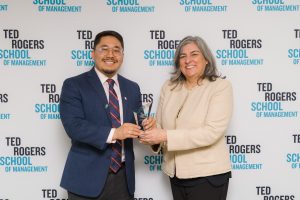
Corporate lobbying impacts innovation and overall productivity in the U.S. Nasir Hossein Dad and his co-author have built a quantitative model that shows how firms decide to invest in lobbying and research and development (R&D) to strategically grow. Dad, a PhD candidate with the Department of Economics, and his co-author, Duc Nguyen have found that lobbying might substitute for R&D, reducing firms’ incentive to innovate, or complement it by increasing returns on innovation, making the net effect uncertain.
“At the micro level, we’re interested in how firms strategically use innovation and lobbying to grow. Are these things substitutes or complements? Empirically, we find that lobbying and R&D tend to be substitutes. As macroeconomists, we’re interested in the aggregate implications,” Dad explained. “We build a general equilibrium model, a macro model, to quantify the effects of lobbying on productivity, innovation, and social welfare. We find that if you completely shut down lobbying, aggregate productivity in the U.S increases by 3.5%. That’s huge. Now, the question that follows is, is it feasible to completely shut down lobbying?”
To examine the question, the pair analyzed their results using a policy matter on the table: U.S. Senator Elizabeth Warren’s proposal to tax lobbying progressively. The pair find that implementing the policy could boost overall productivity by 1.57%, which captures 50% of total gains from eliminating lobbying in the U.S.
“It’s a progressive tax on lobbying expenditures,” Dad said. “Implementing this tax would increases welfare – meaning how societies allocate resources to benefit everyone — by 5% in our model because firms substitute lobbying with innovation, leading to higher output. Most of the gains that come would from shutting down lobbying would stem from the dynamic interaction between lobbying and innovation. If lobbying is shut down, firms make different innovation decisions. About 70% of our social wellbeing gains come from this dynamic channel, changing the distribution of firms in the economy.”
Inspiration for the paper came from issues raised during the Macro Development (MacDev) Working Group, run by Professor Diego Restuccia, Dad’s supervisor, for graduate students at the department. The paper’s real world applications are indicative of the group’s relevance to current economics issues.
“Nasir’s impressive job market paper provides new insights about a highly policy-relevant issue, shedding light on the effect of corporate lobbying on firms’ innovation effort,” said Professor Laurent Cavenaile, a member of Dad’s thesis committee.
“This project goes back to the end of my second year,” Dad remembered. “We started talking about corruption and issues that are relevant to macroeconomic themes. I was big on innovation and looked at insights on corruption. In the work group. we talked a lot about research every week, which was encouraging and motivating. The working group was key and made my PhD experience so much better. You get constant feedback, which stimulates co-authorships like these. I’m grateful for those working groups.”
His work as a teaching assistant has also played a role in helping Dad clarify his research questions and his goals.
“Teaching has influenced my research because some of the questions students ask require a deeper understanding of macroeconomic concepts,” Dad said. “You have to translate those concepts in a way that’s understandable to students who are approaching a new level in their development as economists. The way we understand our model in the study is quite technical, so you need to give a big-picture view when explaining it. Being a TA was instrumental in helping me do that because it develops intuition, which is transferable to research. It’s a training ground where teaching MBA students has helped me improve my own understanding and communication skills.”
 Dad’s work, both at the University of Toronto and in the broader economics and academic community has been winning notice. In October 2024, Toronto Metropolitan University, where Dad did his undergraduate degree, recognized him with an alumni award for “fostering connections across generations of graduates.” He has also won the SSHRC Fellowship with a value of $40,000 for 2024-2025. These fellowships support high-calibre doctoral students in the social sciences and humanities, enabling them to fully focus on their studies.
Dad’s work, both at the University of Toronto and in the broader economics and academic community has been winning notice. In October 2024, Toronto Metropolitan University, where Dad did his undergraduate degree, recognized him with an alumni award for “fostering connections across generations of graduates.” He has also won the SSHRC Fellowship with a value of $40,000 for 2024-2025. These fellowships support high-calibre doctoral students in the social sciences and humanities, enabling them to fully focus on their studies.
Return to the Department of Economics website.
Scroll more news.
